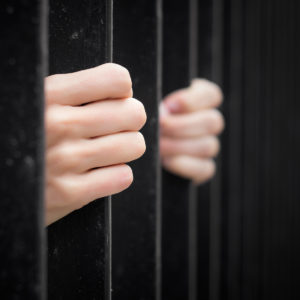Editor’s Note: For an alternative viewpoint, please see Point: Prisoners Should Be Allowed to Vote
Recently Bernie Sanders — one of the leading candidates for the Democratic Party’s presidential nomination — took to Twitter in defense of a controversial position: re-enfranchising felons currently serving time in prison, regardless of their crimes.
“South Carolina has a higher incarceration rate than any country on Earth. African Americans are 27% of the state population but 60% of the prison population. Our racist criminal justice system disenfranchises millions. This is quite simply voter suppression.”
Whether felons should retain the right to vote, and whether they should retain it while incarcerated, are political questions to which I do not offer answers here. However, Sanders’ tweet is seriously problematic on many other fronts. Primarily, it reflects the sort of misleading claims made by felon re-enfranchisement supporters, who paint the issue as one of racial justice.
To begin with, comparing the state’s incarceration rate (or the country’s, for that matter) with the rates of other countries doesn’t reveal anything conclusive about incarceration in South Carolina or the United States because it ignores two important factors that go a long way toward explaining why America’s incarceration rates are relatively high: the U.S.’s comparatively elevated levels of serious violent crime (a favorite talking point of the political left when it comes to the issue of gun control), and the fact that the United States has the wealth that other countries with elevated crime may not have to better fund its criminal justice system.
Specific to Sanders’ tweet, readers should note that South Carolina’s elevated incarceration rate is also very much a function of its comparatively elevated violent crime rate. In 2017, the state’s murder rate was 7.8 per 100,000. That’s well above the national rate of 5.3 per 100,000. New York state, by contrast, had a murder rate of just 2.8 per 100,000.
Moreover, using the black share of the population as the baseline to determine whether blacks are over-represented in U.S. prisons is nonsensical. The harsh reality is that serious, violent crime in the United States is both geographically and demographically concentrated. While black men may make up a greater portion of the prison population than they do of the general population, that is not in itself evidence of bias in the system. Much, if not all, of the disparity can be attributed to the fact that black men commit a disproportionate share of the nation’s most serious violent crime. Though black men constitute about 7 percent of the national population, they account for more than 40 percent of known homicide offenders, according to the FBI’s most recent data.
Consider also that nearly three-quarters (72.9 percent) of all prisoners in the United States are, according to 2017 data published by the Bureau of Justice Statistics, serving sentences for one of just 10 offense categories: murder, negligent manslaughter, rape/sexual assault, robbery, aggravated/simple assault, burglary, larceny theft, motor vehicle theft, “other” violent offenses, and weapons violations.
In South Carolina — the subject of Sanders’ tweet — just four of the most serious offense categories (homicide, burglary, robbery and sexual assault) explain more than half (55 percent) of the state’s prison population.
What these data make clear is that incarceration rates throughout the United States reflect, more than anything else, a policy response to serious, often violent, crime — a response, readers should note, that was not without support from the black community during the high-crime ’80s and ’90s.
There is certainly room for principled disagreement on the question of whether, in general, or in specific cases, that sort of response is wise; but the implication that incarceration rates reflect a racist attempt to disenfranchise blacks is not just wrong, it’s irresponsible.
The level of political discourse has already fallen several notches in recent years. Unfortunately, Sanders’ willingness to incite racial angst to win votes indicates this elevator may still be going down.

